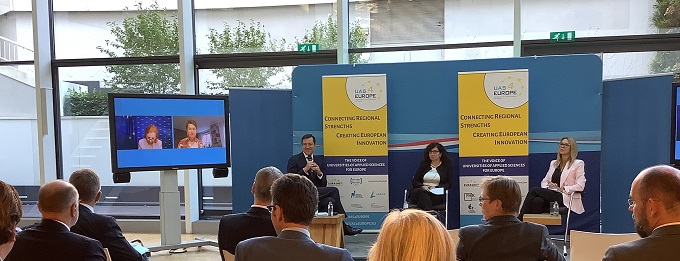Universities of Applied Sciences show the important role of applied research as a pillar of European innovation at the launch of their Innovation Action Plan.
At a formal ceremony and stakeholder event held on 8 October, UAS4EUROPE, the network of 450 European Universities of Applied Sciences (UAS), handed over its Action Plan for Innovation to EU Commissioner Mariya Gabriel and EU Council presidency represented by Slovenian Minister for Education, Science and Sport, Simona Kustec. The Innovation Action Plan makes concrete applied research recommendations for the realisation of the European Innovation Area (EIA).
The Action Plan for Innovation is a contribution to Commissioner Gabriel’s initiative for the new European Innovation Area (EIA), which will complete the knowledge triangle by complementing the European Education Area (EEA) and the European Research Area (ERA). Following the initial idea, expressed by Commissioner Mariya Gabriel, to define a renewed European innovation agenda by creating a single market for innovation, UAS4EUROPE expressed its full support to complement the European Research Area & European Education Area with a dedicated European Innovation Area in an open letter. Subsequently, UAS4EUROPE were invited to offer concrete recommendations for the implementation of an EIA.
The European Commission sees UAS as important actors and stakeholders in regional innovation ecosystems and beyond, as they not only focus on rapid market and societal impact, but also work closely with private and public sector actors to seek applicable solutions. Based on these assets of UAS, the European Commission entrusted the UAS4EUROPE network with the creation of an Action Plan for European innovation. The action plan is the result of a consultation process of an expert group composed of high-level UAS leaders with extensive experience in innovation.
The event, held at the Permanent Representation of the Kingdom of the Netherlands, was opened by the Netherlands Ambassador Michael Stibbe. The presentation of the Action plan by UAS4EUROPE Co-Chair Professor Marjolijn Brussaard, rector of ArtEZ University of the Arts, was followed by political reactions and support statements from Commissioner Gabriel and Minister Kustec. These keynotes in turn set the stage for a high-level panel discussion between Member of the European Parliament Maria da Graça Carvalho, Sabina Herlitschka, CEO and CTO of Infineon Austria, European Commission Director Antoaneta Angelova-Krasteva, responsible for Innovation, Digital Education and International Cooperation (DG EAC), and Chair of UAS4EUROPE Dr. Luciana Vaccaro, Rector of UAS Western Switzerland.
The action plan first outlines the concrete strengths of UAS in innovation ecosystems: (i) their practice-based approach promoting innovation competencies and an entrepreneurial mindset in students, (ii) their focus on transdisciplinary challenges & creating lasting regional impact, (iii) their role linking fundamental research to market application of new technologies and societal challenges, and (iv) working as drivers of innovation ecosystems due to their regional embeddedness.
Overall European challenges and specific regional challenges are outlined, together with explanations of how UAS can contribute to tackling those challenges, from ensuring European competitiveness in the next technology wave, connecting innovation to broad-based welfare, to fostering diversity and addressing the skills gap in new technology sectors.
Finally, 12 specific recommendations aim to inform the concrete implementation of the European Innovation Area, ranging from deeper links between ERASMUS+, COSME’s successor programme and the EIT to seeking synergies across national and regional innovation strategies through the European Innovation Ecosystems instrument within the Horizon Europe programme.
The UAS4EUROPE innovation action plan is one initial step in an ongoing dialogue between the European institutions and the innovation stakeholder community regarding the measures necessary to strengthen innovation in Europe and to ensure that the economic and societal benefits of those innovations is felt by all citizens.

